 Petzlover
PetzloverBoth Grand Anglo-Francais Blanc et Orange and Talbot are originated from France. Both Grand Anglo-Francais Blanc et Orange and Talbot are having almost same height. Grand Anglo-Francais Blanc et Orange may weigh 14 kg / 30 pounds lesser than Talbot. Both Grand Anglo-Francais Blanc et Orange and Talbot has same life span. Both Grand Anglo-Francais Blanc et Orange and Talbot has almost same litter size. Both Grand Anglo-Francais Blanc et Orange and Talbot requires Low Maintenance.
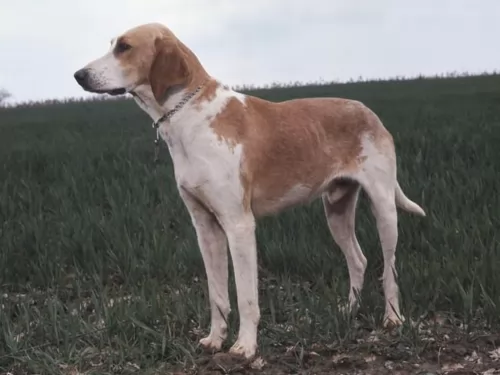 The Grand Anglo-Français Blanc et Orange is one of three Grand Anglo-Français breeds. The dogs comes from crossing French scenting hounds with English Foxhounds way back in the 19th century.
The Grand Anglo-Français Blanc et Orange is one of three Grand Anglo-Français breeds. The dogs comes from crossing French scenting hounds with English Foxhounds way back in the 19th century.
The sporting dog is rare, believing to be be pretty much confined to their country of origin – France. It is recognized in France by the French Kennel Club and also internationally by the Federation Cynologique Internationale. Since 2006, they have been recognized by the UKC and are thought to be kept essentially as a working dog as opposed to being kept as a companion dog.
Known as the Talbot Hound, nobody really seems to have accurate records as to the origins of the Talbot dog breed but it seems to have originated in France.
It is believed that the Talbot, with his excellent nose, was a hunting dog, but he is now extinct.
It is thought that the dog descends from the beagle and the bloodhound. It came to England in 1066 and vanished towards the end of the 18th century.
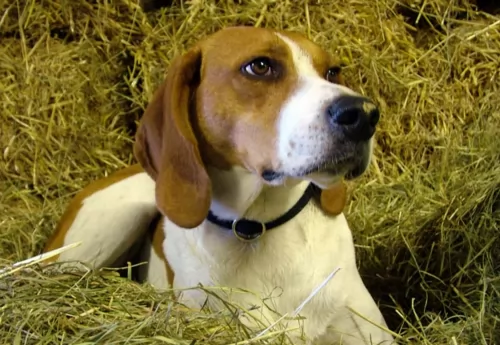 The lean, muscular Grand Anglo-Français Blanc et Orange is a large, powerful dog standing at 60 – 70cm at the withers and weighing 30 to 36 kg.
The lean, muscular Grand Anglo-Français Blanc et Orange is a large, powerful dog standing at 60 – 70cm at the withers and weighing 30 to 36 kg.
He has a short, broad head with a broad, flat skull. He has long legs, a long tail and long, floppy ears. His coat is white with orange markings. These dogs are instinctive hunters with a superb sense of smell and the ability to track their prey for miles.
Sociable, independent, loving and loyal, the Grand Anglo-Français Blanc et Orange can become attached to his owner. He doesn't want to be left alone for long periods of time, becoming bored and destructive.
Training and socialization is excellent for your dog, making him obedient and also more relaxed when you're not there.While he is patient and good with children, if you're looking for a playful pet, this dog wouldn't come as recommended for children, as his heart longs to just be outside on the hunt.
The Talbot hound was a large, white purebred dog. He stood at roughly 58 to 69cm and weighed between 36 and 50kg.
He had a large head and a short, smooth, coarse pure white coat. He has a long tail which he held upright and fairly long floppy ears. He was a slow but efficient scenthound.
It is believed that this strong, hard working dog was gentle, loving and loyal and that he would have made an excellent family pet.
They were the kind of dogs that needed lots of social interaction with his human family. His amicable nature would have meant him getting on well with children and other dogs.
Slow, it’s a dog that had low intelligence and he may have taken a long time to learn any simple tricks or commands. If he were around today he wouldn’t have been suited to city living as he was a vocal breed – having quite a selection of barks and howls to voice his opinion.
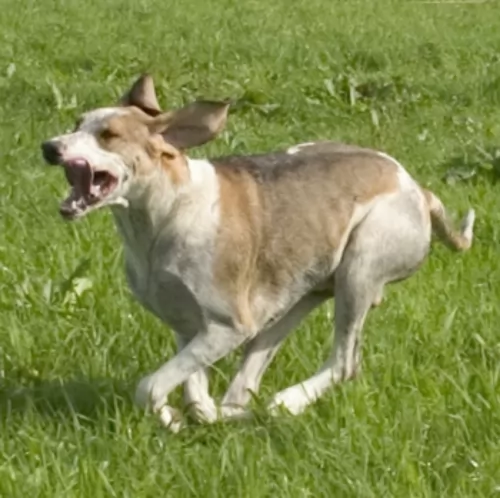 The Grand Anglo – Francais et Orange has always been a pack dog and used to being social. He will get on well with his entire human family as well as with any other pets in the home.
The Grand Anglo – Francais et Orange has always been a pack dog and used to being social. He will get on well with his entire human family as well as with any other pets in the home.
The Grand Anglo-Francais Blanc et Orange is a loyal dog, and when trained he becomes an excellent companion. He is patient with children, but doesn't make a particularly great playmate as he has a more serious personality.
The Grand Anglo-Francais Blanc et Orange is a dog that has been specifically developed to hunt, so ensure that he gets a good amount of exercise. While he is essentially a dog that loves working in a pack, he can still make his human family a loving and devoted pet.
The Talbot is extinct, but he was no doubt a docile, calm kind of dog that would have made a great family pet.
He would have been an ideal dog for first time dog owners too as he was a gentle, affectionate dog.They were tough, protective, stubborn but loving and loyal, and more’s the pity that this dog has disappeared.
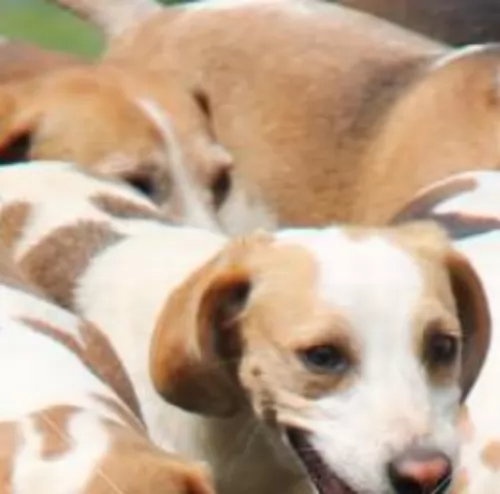 Capable of reaching 10 to 12 years in age, you won't really find any particular health issues with this dog. He is a fairly healthy dog and will be able to reach a good age with good nutrition, exercise, love and care.
Capable of reaching 10 to 12 years in age, you won't really find any particular health issues with this dog. He is a fairly healthy dog and will be able to reach a good age with good nutrition, exercise, love and care.
Because of the long, floppy ears, you want to be checking inside the ears. As a hunting scentdog, he will chase his prey through water if needs be, and damp ears can encourage bacteria.
Ear infections are common in most dogs, and you'll notice your pet scratching and rubbing at his ear and even shaking his head. You may also notice swelling or redness. Veterinary intervention will be necessary.
If your dog's ear infection has cleared up, you can maintain the health of the ear by cleaning them with a gentle cleanser and cotton wool. There is always caution when cleaning a dog’s ear, and rupturing the ear drum is one. Be careful, and if you're not sure, rather make an appointment with your vet to have his ears cleaned.
Nobody can say what the health status of the Talbot dog was, but being a hunting dog, out in the open and getting plenty of exercise, he was no doubt a healthy dog. But all dogs can fall ill at some time or another with any one of the many dog illnesses there are -
Ear infections in dogs are quite common, but more so with dogs that have floppy ears.
You’ll see your pet scratching and pawing at his ears and shaking his head. There will in all likelihood be redness in your pets ears and you may even detect an abnormal odor.
There are quite a few things that can cause these ear infections in dogs such as ear mites, an excess of dirt and wax and bacteria.
Don’t allow your pet to suffer – get him to the vet. Your veterinarian will also show you how you can clean the ear for future times with a gentle cleanser. You have to be so careful not to rupture the ear drum, and some people prefer to get their vet to do this or professional groomers.
The Talbot could have suffered with ectropion – when the lower lids are turned out. Ectropion disrupts the function of the lower lid so that it can't protect the eye, and there is abrasion of the surface of the eye.
This condition can also bring on conjunctivitis. Get your pet to the vet for treatment and relief.
The lifespan of the Talbot was anything from 9 to 12 years of age, and one or two other health problems that could have shortened his life were dermatitis, cancer, hip dysplasia and eye infections.
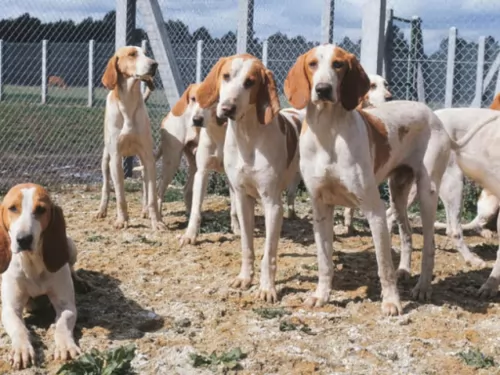 As a scenthound, your Grand Anglo-Français Blanc et Orange loves being outdoors and following a scent trail. These dogs therefore are better suited to life in the countryside as opposed to life in the city. Make sure you provide him with plenty of exercise – walks, swimming and running with you when you go cycling or jogging. Include ball- and rope games too.
As a scenthound, your Grand Anglo-Français Blanc et Orange loves being outdoors and following a scent trail. These dogs therefore are better suited to life in the countryside as opposed to life in the city. Make sure you provide him with plenty of exercise – walks, swimming and running with you when you go cycling or jogging. Include ball- and rope games too.
Your orange and white scent dog will thrive on you taking time out for him to brush his short coat twice a week and to also check for fleas and ticks at the same time.
Looking forward to his food, your energetic Grand Anglo-Français Blanc et Orange will require a high quality commercially manufactured food. Make sure that you buy the best brands to ensure your pet gets his vitamins and minerals in instead of just a lot of fillers, colorants and preservatives.
Many dog owners prefer giving their dogs several smaller meals throughout the day as opposed to one or two large meals. With his dry kibble you can add in some raw meat from time to time as well as cooked brown rice, cooked chicken and vegetables. See that he has access to a constant supply of fresh, cool water.
The Talbot with his short hair would have been looked upon as a low maintenance breed and would have required a brush now and again.
Because of the floppy ears, they would have needed to be checked inside for infection.
The Talbot was a strong, hard-working kind of dog so if commercially manufactured dog food was available in that time, you would have ensured a good quality one for strong, energetic dogs.
At that time, Talbot dog owners tossed their dogs bits of raw meat. Home-made food like boiled chicken, brown rice, spinach, carrots and sweet potatoes without any exotic flavorings would have been an excellent diet.